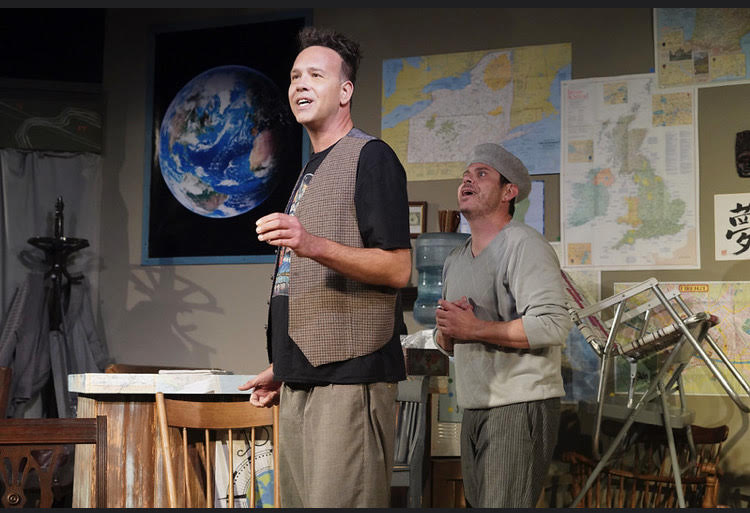James Darvas and Salomon Maya
Leave it to OnStage Playhouse to come up with something strange, weird and fascinating.
OnStage Artistic Director James Darvas takes center stage as one of the two characters in Steven Dietz’s 1993 “Lonely Planet,” in which two men try to weather the frightening times of the AIDS crisis with food, friendship and … well, and chairs.
Darvas plays Jody, a map store owner whose shop is depicted in Duane McGregor’s set design. The walls are covered with maps. Close by (apparently near the opening of Jody’s store) lives Carl (Salomon Maya), a younger jack-of-all-trades who does whatever type of job he can find. Sometimes it seems to involve building; others rebuilding or retouching things that have become damaged, such as art works.
As both Carl and Jody are single and unattached, they get a certain amount of community with each other, though outwardly they seem to have little in common.
Carl strews Jody’s store with a seemingly endless number of chairs. One wonders where they come from, and why Carl seems to collect them is a bit of a mystery, as are several other things.
They make an odd couple, especially when they occasionally decide to “play the game where they tell the truth,” leaving the observer to wonder if they’re both lying the rest of the time – and why. Or do humans always lie? It’s something to ponder.
It seems evident that Jody is fearful of AIDS. Carl’s problem seems more immediate – where will he make a few bucks?
In the second act, Jody goes to get an AIDS test, and Jody’s shop becomes quite crowded with the number of chairs Carl has been bringing. Chair after chair, and finally we find out why. It’s not Carl’s fondness for wooden chairs, but something much sadder.
“Lonely Planet” is well named, and the actors absolutely top-notch. I’d never seen Darvas on the stage before, but he plays with both conviction and style.
Maya has been seen on this stage before, and is equally excellent as the somewhat mysterious Carl.
Credit former OnStage Artistic Director Teri Brown with a brilliant directorial job on this difficult piece. She’s careful not to try to explain anything directorially, but to let the piece speak for itself. Welcome back, Teri.
Love, loss, hope, fear and acceptance of the unknown and perhaps unknowable. It’s a heavy night of theater, but one well done and worth seeing.

No comments:
Post a Comment